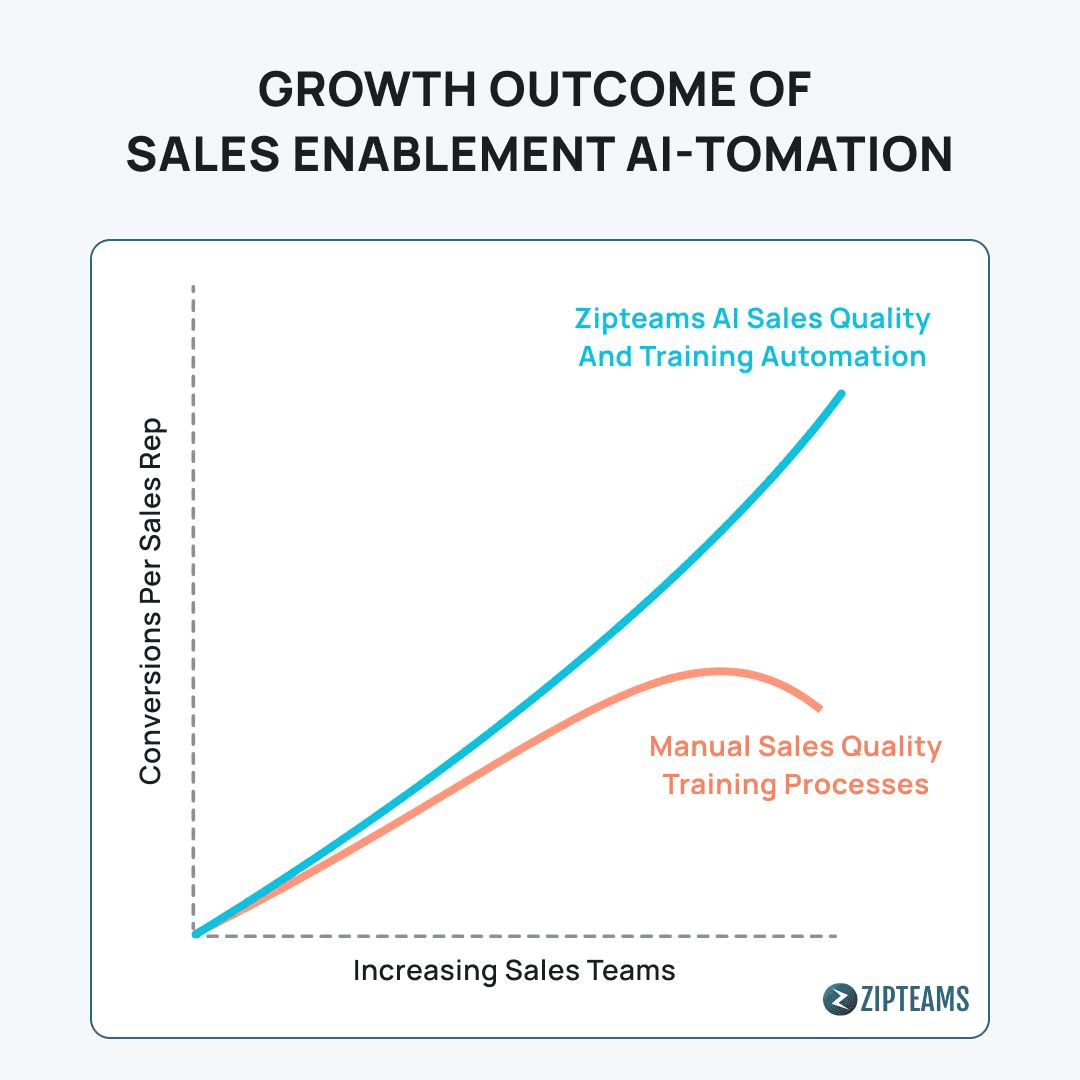Key Roles And Structures In Sales Enablement Team Building
Essential sales enablement roles include Leader, Content Specialist, Training Manager, Technology Manager, Coach, Performance Analyst, and Collaboration Manager.
Ramya S.
Nov 18, 2024
B2B Sales
Sales
The Gartner B2B Buyer Survey shows that 75% of customers prefer to learn and interact using digital channels. As the customers are moving into the future, the sales sector also started to engage with new technologies. In the virtual age, the success of your business solely depends on the talents of your sales team and their smart selling competencies. Sales enablement strategies have been crucial in equipping sales reps with the necessary skills and tech stacks. As per the Gartner report, more than 50% of CSOs believe that enablement will support marketing and/or customer success roles in the next three years. As AI sweeps the tech market, sales enablement team building is increasingly optimised and automated with AI sales enablement tools. With Automation and deep analysis, AI tools are bolstering sales enablement roles in major business sectors. Sales enablement roles are now equipped with efficiency thanks to smart AI sales tools. This guide will walk you through the detailed sales enablement roles for successful team building and explain how AI can enhance and improve enablement roles for a better sales process.
What is Sales Enablement?
At its core, sales enablement involves providing your sales team with the resources they need to sell more effectively. This includes everything from content and training to technology and analytics. The goal is to streamline the sales process, improve customer engagement, and ultimately increase revenue.
The Importance of a Well-Structured Sales Enablement Team
A well-structured sales enablement team is the backbone of any successful sales organisation. Without the right roles in place, your sales reps may struggle to access the tools and resources they need. A focused sales enablement team ensures your reps are trained, have relevant content, and are empowered with the latest data insights. Also Read: How Generative AI Can Completely Automate Your Sales Enablement Training: Benefits and Best Practices
Key Sales Enablement Roles
Building an efficient sales enablement team requires a variety of roles that contribute to the success of the sales team. Each role has a specific focus, whether it’s strategy, content creation, technology management, or cross-functional collaboration. Together, these roles ensure that sales reps have the tools, training, and support needed to perform at their best. While there are no universal roles in the sales enablement team structure, the following seven roles are important for an optimal sales enablement strategy.
Sales Enablement Leader
Content Specialist
Training and Development Manager
Sales Technology Manager
Sales Coach
Performance Analyst
Cross-Functional Collaboration Manager
Let’s look at the detailed roles and responsibilities of sales enablement teams
Sales Enablement Leader
The Sales Enablement Leader is responsible for setting the strategy that aligns sales enablement initiatives with overall business goals. They ensure that resources, tools, and processes are optimised to support the sales team's success. Responsibilities include:
Developing and executing the enablement strategy.
Managing resources and cross-departmental collaborations.
Tracking the success of enablement initiatives.
The leaders can use modern AI tools that provide real-time insights into the effectiveness of enablement strategies. By tracking performance metrics and suggesting improvements, AI tools equip you with solid data to customise your enablement plans. For example, with Zip Score, you can set up your quality parameters for sales calls and get automated quality outputs on every call. Zip Score can send personalised sales training feedback to sales reps after every call and enable managers to coach and train sales reps in real-time.

Content Specialist
The Content Specialist ensures that sales teams have access to relevant, up-to-date content that supports each stage of the buyer’s journey. They manage a content library that is essential for sales success. Responsibilities include:
Creating, curating, and maintaining the sales content library.
Ensuring content is aligned with sales processes.
Analysing content usage and effectiveness.
With Generative AI, Content specialists can recommend and generate content based on customer behaviour and past interactions. Gen AI can produce training materials like product guides, sales playbooks, presentations, and blogs within in minutes. AI streamlines the content creation process by automating manual tasks like generating and personalising at scale, and all this with grammatical errors. Also Read: Why Generative AI Adoption is one of the Must B2B CRM Strategies for Business Growth
Training and Development Manager
The Training and Development Manager is responsible for designing training programs that enhance the skills of the sales team, ensuring they are prepared to meet their targets and handle customer needs effectively. Responsibilities include:
Developing sales training programs.
Refining curricula to match evolving product knowledge.
Monitoring training effectiveness.
AI-powered learning platforms can provide personalised training experiences and real-time feedback, helping sales reps continuously improve their skills. AI can also track training performance and recommend updates to training materials.
Sales Technology Manager
The Sales Technology Manager focuses on implementing and optimising the tools and CRM systems that sales teams use daily. They ensure that technology supports sales efforts efficiently. Responsibilities include:
Implementing and managing CRM systems.
Optimising sales tools to streamline workflows.
Ensuring seamless technology integration.
AI-powered sales tools can automate routine tasks within CRM systems, such as data entry and lead prioritisation, allowing the technology manager to focus on optimising workflows. AI tools can also provide insights into how sales technology is being used and identify areas for improvement.
Sales Coach
The Sales Coach provides direct support to sales reps, helping them improve their selling techniques and stay motivated. They play a critical role in boosting individual and team performance. Responsibilities include:
Delivering one-on-one coaching sessions.
Motivating the sales team.
Monitoring individual performance.
AI can analyse sales rep performance data and offer personalised coaching recommendations. This helps coaches focus on specific areas for improvement, such as call effectiveness or customer engagement tactics, ensuring more targeted coaching efforts.
Performance Analyst
The Performance Analyst tracks the success of sales enablement initiatives by analysing data and providing insights into what’s working and what needs improvement. Responsibilities include:
Monitoring sales KPIs and performance metrics.
Providing actionable insights to the sales enablement team.
Measuring the ROI of enablement strategies.
AI tools can automate the collection and analysis of sales data, offering predictive analytics that help analysts forecast future performance and identify potential challenges. This allows for quicker decision-making and more accurate performance evaluations. Also Read: Sales Enablement Analytics: Measuring Performance and Roles
Cross-Functional Collaboration Manager
The Cross-Functional Collaboration Manager ensures that the sales enablement team works smoothly with other departments like marketing, product development, and customer service, aligning efforts across the organisation. Responsibilities include:
Facilitating communication between departments.
Aligning sales enablement strategies with other team goals.
Ensuring smooth collaboration on projects.
AI can streamline communication between departments by providing shared dashboards and real-time updates, helping teams stay aligned on common objectives. AI tools can also analyse collaboration efficiency and recommend adjustments to improve teamwork across departments.
Impact of Defined Roles on Sales Processes
Having clearly defined sales enablement roles directly improves the efficiency and effectiveness of your sales process. Each role contributes to smoother operations, better communication, and more targeted efforts that align with business goals. When everyone knows their responsibilities, the sales process becomes streamlined, with fewer bottlenecks and improved outcomes.
Improved Communication: Clear roles ensure that departments like marketing, sales, and product development work and collaborate together seamlessly.
Enhanced Accountability: With specific responsibilities, each team member knows what’s expected of them, boosting accountability.
Higher Efficiency: Well-structured roles reduce redundancy, allowing teams to focus on what they do best, leading to more effective sales strategies.
These roles drive success by ensuring that sales teams have the tools, training, and content they need at the right time, ultimately boosting conversion rates and improving sales outcomes.
Key Structures for an Effective Sales Enablement Team
Building a successful sales enablement team involves creating a structure that supports collaboration, clear communication, and seamless alignment with business goals. A well-structured sales enablement team ensures that sales reps are equipped with the right tools, content, and training to improve sales productivity and overall performance. Here are some key components to consider when structuring a sales enablement team:
Cross-Functional Collaboration
Sales enablement teams must work closely with other departments such as marketing, product development, and customer support. This collaboration ensures that all teams are aligned on messaging, content, and overall strategy, ultimately leading to a more cohesive sales process. Regular communication between these departments is crucial to maintaining a unified approach.
Content and Training Alignment
One of the key responsibilities of the sales enablement team is to ensure that content is not only created but also effectively distributed to sales teams at the right time. This includes everything from sales presentations to product training materials. Structuring the team to focus on content management and training delivery is crucial for improving sales effectiveness.
Sales Technology Integration
The sales enablement team must work closely with the Sales Technology Manager to implement and optimise CRM systems and other tools. This ensures that technology supports the sales process and enables seamless tracking of customer interactions, deal progress, and team performance. This structure ensures that the sales enablement team remains agile, responsive to sales needs, and aligned with the broader business goals. With an understanding of sales enablement roles and structure, you must be eager to execute a well-designed enablement plan for your team. There are certain practical checkpoints you must look at before building your team.
How to Build an Effective Sales Enablement Team
Building an effective sales enablement team requires strategic planning and thoughtful alignment with business objectives. The team’s structure and goals must support the broader vision of your company while providing sales reps with the tools and resources they need to succeed.
Set Realistic and Achievable Goals: Define clear and measurable objectives for your sales enablement team, focusing on outcomes like increased sales productivity or improved lead conversion rates.
Align Team Roles with Company Objectives: Ensure that each role within the team, whether it’s content creation or performance analysis, supports the overarching sales goals of the business.
Identify and Allocate Necessary Resources: Assess the tools, budget, and technology required for your team to function efficiently. Make sure you provide the right CRM platforms, AI tools, and learning resources that help the team achieve its goals.
The Future of Sales Enablement with AI

AI is rapidly transforming the world of sales enablement by automating routine tasks, providing personalised content recommendations, and delivering real-time insights into sales performance. As AI continues to evolve, it will play an even bigger role in helping sales enablement teams optimise processes, reduce administrative work, and enable faster decision-making. As per the seismic survey, 93% of their respondents are planning to invest in enablement tech because they believe AI can strengthen their enablement efforts. Of those existing users of AI, 82% of respondents are impressed with the results and plan to implement more AI-powered solutions in the next 12 months. In the future, AI will likely become the core of sales enablement, providing advanced analytics that not only track performance but also predict outcomes and suggest tailored strategies.
Zip Score: AI-Driven Tool For Efficient Sales Enablement
Zip Score is an AI-powered training automation tool offered by Zipteams. Powered with conversational intelligence, Zipscore can assess your training and sales quality playbook with every sales call. From Real-time call quality scores to insightful reports and customised dashboards, Zip Score can equip you with deep analysis into your sales enablement teams.

Zip Score offers a host of features to automate your sales enablement with ease:
Conversational Analytics: Zip Score can deep-dive into your sales calls with standard analytics on talk-ratio, dead air and sales pitch scores.
Automated Agent Training: Zipteams offers tailored training for your agents with instant feedback on every call.
Workflows for Managers and Admins: With Zip Score, the sales enablement team can create workflows to give feedback to sales reps.
Intelligent Sampling: You can set coverage of calls as per your needs and budgets to cover more new joiners, specific disposition calls, or past scores of reps.
Dashboards & Reporting: Zipteams offers standard and custom dashboards to visualise call quality analysis.
CRM Integration: Zip Score can integrate with your CRM and automatically update the call quality reports to the CRM database.
Join the future of sales enablement with Zipteams and implement smart and automated training processes for your super sellers.

